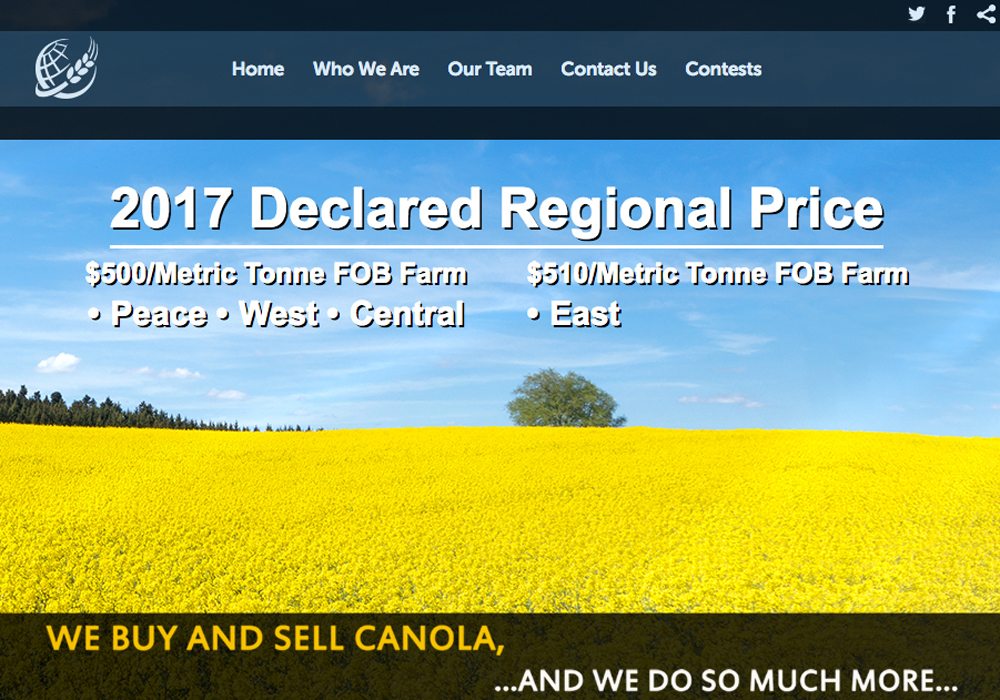Company claims breech of contract, seeks $7.8 million from Sask. farmer over delivery arrangement that went wrong
REGINA — Terry Gustafson has been farming near Macoun, Sask., for most of his life, but he has spent a great deal of time in court lately in a case involving himself and Input Capital Corp.
Input Capital pays farmers in advance for their crops, mainly canola. The farmers rely on Input Capital to take delivery of the crops after harvest on behalf of country elevator buyers that Input contracts with.
Input Capital’s case against Gustafson began in the fall of 2015 when it paid him $4.5 million toward his crop inputs and to pay off other creditors from April 2, 2014, until May 28, 2015.
Read Also

Using artificial intelligence in agriculture starts with the right data
Good data is critical as the agriculture sector increasingly adopts new AI technology to drive efficiency, sustainability and trust across all levels of the value chain.
Gustafson said Input Capital sought him out and provided him with $800,000 on April 2, 2014, to buy the canola that Gustafson could not sell because of a rail car shortage, using Input Capital’s connection to Viterra.
This led to Gustafson signing his first contract with Input Capital in May 2014.
The falling out between Gustafson and Input Capital occurred Sept. 3, 2015, when employees from Input Capital entered Gustafson’s father’s bin yard and took possession of several truckloads of durum. That year, the contract stated Input Capital owned all of Gustafson’s crops, not just canola. However, Gustafson claimed he was told the company owned only his canola.
Input Capital had the durum wheat delivered to the Viterra terminal in Weyburn, Sask.
“We did not force ourselves onto that yard,” Gord Nystuen, Input Capital’s vice-president of market development, said March 7 while testifying in Court of Queen’s Bench in Regina.
“In fact, Terry had told us which bins we should be taking from.”
Nystuen was Gustafson’s contact when he entered into contracts with Input Capital.
An affidavit filed by Input Capital’s legal counsel on April 15, 2016, said Gustafson owed Input Capital $7,892,975. The company claimed Gustafson breeched his contracts with Input Capital. The interest charges on the contracts Gustafson signed amounted to $3,392,975, which Gustafson said is excessive.
While on the stand, Nystuen reviewed Gustafson’s record of sales for his 2014 crop season. Gustafson claimed he had no saleable No. 1 Canada canola, but the records show the canola sold was listed as No. 1 Canada.
When Gustafson took the stand March 8, he said he had sold his 2014 canola to a company in Manitoba, but it was mixed with kochia weed seed and was green. He said Nystuen was aware of this transaction.
“None of the elevators that Input Capital had contracts with would accept this grain,” Gustafson said.
“(The company) was overlooking the fact that the grain was not a No. 1 canola and they were giving us a No. 1 for it.”
Gustafson said he was paid for No. 1 Canada canola because of how far he had to travel to deliver it and how desperate the crushing plant was for the product.
Input Capital also claimed Gustafson received the profit from one of the nine truckloads of durum delivered Sept. 3 and Sept. 4, 2015.
“I confronted Terry and he said, ‘are you accusing me of stealing?’ I said, ‘we hauled seven loads and got paid for six. There’s a load missing and it’s our understanding that it was paid to you.’ At that point, Terry asked me to leave his property,” said Nystuen.
“He did not physically threaten me, but he did say, ‘if you come back, I will beat the crap out of you.’ I left his yard site and reported that information to my supervisors.”
Gustafson said D.J. Knoll Transport Ltd., which was instructed by Input Capital to deliver the durum, was responsible for the mistake. One of D.J. Knoll’s truck drivers told Viterra, which owned the grain, and that was how Gustafson’s account received the payment for the one truckload of approximately 1,650 bushels.
“I believe it was load No. 7 on the third that got dumped on the fourth and that driver made the mistake at Viterra and told them the load belonged to Terry Gustafson and not to Input Capital. That caused a great big commotion,” Gustafson said.
Gustafson said Viterra had logged it improperly.
“I knew nothing about it. When Gord accused me of what is paramount to theft, I got furiously angry,” Gustafson said.
Gustafson’s legal counsel said Input Capital did not fulfill certain obligations in its contract, mainly an assigned agrologist to work with Gustafson on his farm.
Gustafson said the verbal agreement he entered into with Nystuen was not the same as the written contracts he signed. Gustafson did admit he did not read the contracts before signing them, but he did say he was not provided with the contracts until September 2015.
In its evidence, Input Capital provided an envelope that showed the contracts were mailed but returned because Gustafson never picked them up.
The court case will reconvene April 13 for closing remarks.















